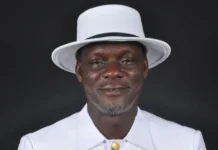By Sunny Awhefeada
This title is a hackneyed adaptation of Jesus Christ’s submission that “a prophet is without honour in his own country” as recounted in the Bible in Mark chapter 6 verse 4. The scripture speaks to the tendency for one’s folk to look down on one no matter the height one has attained. It simply connotes being taken for granted by one’s own people. That was the lot of Jesus Christ of Nazareth and he did weave it into his admonitions. Of course, there are always exceptions to some rules if not every rule. One of such exceptions is taking place come Saturday 26th April at the Delta State University, Abraka, where one of the world’s leading poets, Tanure Ojaide, would be garlanded with an honorary Doctor of Letters (DLitt) during the University’s seventeenth convocation ceremony. Poets are prophets. The Romans said so. Ojaide has in theory and praxis approximated that calling, a calling he heeded nearly six decades ago. This honour coming from the Delta which is the lifespring of Ojaide’s afflatus reframes the narrative of honour as an ideal that the homeland also offers. Loud peals of approbation shall erupt for Ojaide at Abraka on Saturday, and as the world looks on admiringly and nods in consent, I have chosen to re-present excerpts from my tribute for Ojaide when he turned seventy some years ago.
Moses Odafetanure Ojaide has evolved to be one of the outstanding poets in the world today. Ojaide has aptly framed the Nigerian experience in poetry and prose, and provided critical insights into the appraisal of African letters and folklore. What marks out Ojaide in his literary vocation is his commitment to the representation of his homeland which primarily is Nigeria’s Niger Delta, the oil rich but devastatingly impoverished region that has suffered untold assault in both colonial and post-colonial times. In prose as in prose, Ojaide depicts the region as a wasteland frazzled by the greed of the ruling elite and the rapacious oil multinationals. Often indulging in writing the self, his poetry romantically evokes the idyllic ambience of his childhood in his Urhobo homeland in the Niger Delta. His programmed poetic arc takes the reader beyond the contemporary into the past, receding into folkloric memory constituted by myths and legends which give the Urhobo their unique identity.
His first literary offering is Children of Iroko and Other Poems (1973) can be read as giving a clear direction of what has become a flourishing literary career. Strongly rooted in Urhobo lore, the collection bemoans the consequences of the Nigerian Civil War. However, it is for its privileging of Urhobo lore and life woven through indigenous aesthetics that the collection is best remembered. The poems bring into conspicuousness the religious rites, the pristine streams, the water goddess and other indices which define the existential experience of not only the Urhobo, but much of the Niger Delta.
The collection not only engages the new experience which the end of the Civil War offers, but the poems espouse a novel aesthetic sensibility which inheres in the preoccupation with indigenous aesthetics that the poetry of the next generation of poets imbibed. The unflinching allegiance to the common man which was to dominate the poetry of the 1980s is also present in Children of Iroko. . . . Themes of deprivation, exploitation, corruption and military adventurism in the nation’s politics which define the collection turned out to be the thematic anchor of not just poetry, but also the drama and prose that followed. Ojaide is probably Africa’s most prolific poet and to his credit are more than thirty collections of poetry.
His poetic oeuvre which has been translated into more than ten foreign languages can conveniently be divided into three phases which are however knit into one holistic engagement with Nigerian history and human experience. The first phase is occupied by Children of Iroko… which is his introit in the poetic vocation. It is a forerunner to the other collections which engage the unending problems of corruption, bad leadership, environmental degradation and other themes of universal import. A familiar reader of his later works would trace the bold lyrical sweep and unpretentious commitment to an advocacy for the cause of the downtrodden, a strain which has remained consistent in his poetic practice.
The next phase comprises poems published from around the late 1980s to the 1990s. The period coincided with the advent of the Structural Adjustment Programme (SAP), the economic policy forced on the nation in the late 1980s. The poems here constitute a significant diatribe against military dictatorship and its vagaries as well as economic exploitation and poverty. The poems also coalesce into a revolutionary framework against the background of the ecological crises in the Niger Delta which peaked with the hanging of Ken Saro-Wiwa, the Niger Delta environmental rights activist in 1995. The tone of the poems is unmistakably militant reflecting the prevalent mood of acute anger in the Niger Delta region. There is no doubt that the intensity of feeling, mood and language deployed by Ojaide helped in no small way in drawing the world’s attention to the grave ecological situation in the Niger Delta. In fact so intense and preoccupied are some of the poems in this phase that many critics tend to see him principally as a poet of the Niger Delta condition. But such a reading negates his pan-Nigerian poetic vision and engagement.
The third phase of his poetry spans the years 2000 till date. The beginning of this phase of his writing is unique in that it was the beginning of a new century which also coincided with the end of military dictatorship. Since the main target, which is military rule, has been dislodged, the poet has to rethink new themes and directions. Ojaide did not have to look too far. The vestiges and memories of the preceding decade still provided matters and materials for his contemplation just as his eco-conscious preoccupation remains an abiding motif. Yet, an unmistakable new direction evolved in his poetry. Ojaide rethinks and privileges the many nuances of the rich oral poetic tradition of udje of the Urhobo people. Some of the titles of the collections carry such key words like “song”, “dance”, “words”. “tale”, etc, to foreground the character of the indigenous heritage of his poetry. A number of the poems here reflect Ojaide’s personality as a global citizen as they capture his travels and experiences thereof. While they can be described as travelogues they bear the mark of his Niger Delta homeland even as they reflect the scars which the Nigerian nation left on his psyche. The poems also lean towards metaphysical and abstract tendencies which very much differ from the earlier ones.
Ojaide’s literary career is also remarkable for his highly successful cross-generic experimentation. Although, better known as a poet, he was to venture into the genre of prose weaving significant narratives that portray his comprehension of the anatomy and craft of fiction. To his credit are the following novels and short stories: The Old Man in a State House & Other Stories (2012). Stars of the Long Night (2012), Matters of the Moment (2009). The Debt-Collector & Other Stories (2009). The Activist (2006).Sovereign Body (2004), .God’s Medicine Men & Other Stories (2004). Ojaide’s fictional narratives resonate with the concerns of his poetic representations. His engagement with the prose genre has also seen him writing two memoirs in the realm of non-fiction namely: Drawing the Map of Heaven: An African Writer in America (2012) and Great Boys: An African Childhood (1998).
Ojaide has also distinguished himself as a literary scholar and critic. He epitomizes the Nigerian tradition of scholar-poets as his critical submissions in books and journals have become touchstones for literary scholarship in Africa and beyond. Among his full length critical studies on African literature and culture are Indigeneity, Globalization, and African Literature: Personally Speaking(2015). Contemporary African Literature: New Approaches (2012).Theorizing African Oral Poetic Performance and Aesthetics: Udje Dance Songs of the Urhobo People (2009).Ordering the African Imagination: Essays on Culture and Literature (2007).A Creative Writing Handbook for African Writers and Students (2005).Poetry, Performance, and Art: The Udje Dance Songs of the Urhobo People (2003).Poetic Imagination in Black Africa: Essays on African Poetry (1996). His robust critical output has enriched and updated scholarship on African aesthetics.
His creative and scholastic endeavours have earned him the following honours and awards: Commonwealth Poetry Prize (1987), BBC Arts and Africa Poetry Award (1988), All Africa Okigbo Prize for Poetry (1988 and 1997), Association of Nigerian Authors (ANA) Prize for Poetry (1988, 1997, 2003 ad 2011), the 2005 UNC First Citizen Bank Scholar Award, the Fonlon Nichols Award (2014), the Nigerian National Order of Merit (2016), and many more. He is the Frank Porter Graham Distinguished Professor of Africana Studies at the University of North Carolina at Charlotte. His advocacy for the retrieval of his devastated homeland, the recovery of its purloined resources as well as restitution for its disillusioned people will continue to earn him Uhangwha and Aridon’s cushioning. The drums have started reverberating at Abraka!























